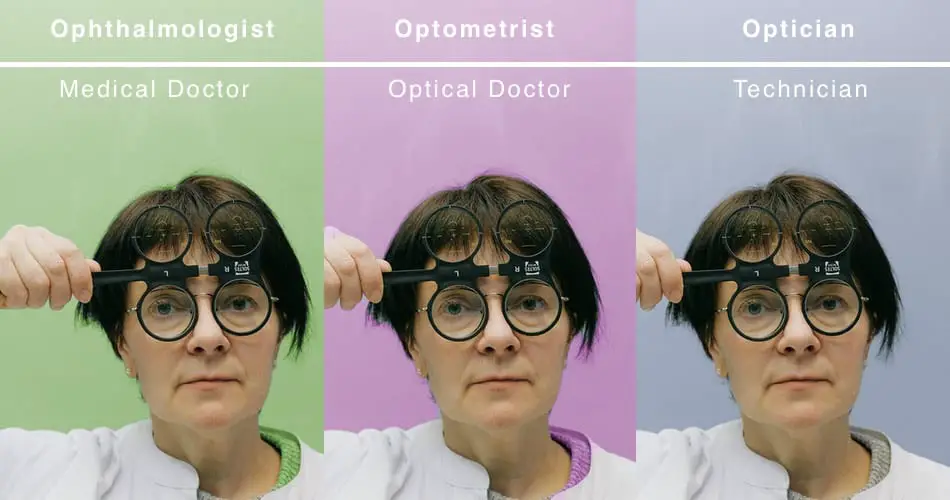Getting the correct information about your eye-related topics requires you to have the right eye care specialist for certain types of topics. Here in this article, you will learn about the differences amongst Ophthalmologists, Optometrists, and opticians. A lot of people mix up those different terms when in reality they are specialized in different areas in the eye care business.
First of all, you will get a quick overview of the specialties of Ophthalmologists, Optometrists, and opticians to get an understanding of what they do and where their focus is set. Because the levels of training and expertise are very different for each type of profession. There are some topics that overlap here a little bit after reading the short descriptions you will see the differences quickly. Here’s a quick look at the three types of eye care specialists:
Ophthalmologist
The ophthalmologist is a medical doctor. He or she diagnoses eye-related diseases and could use medication to treat a disease. When the ophthalmologists perform checkups of the eye medical parameters are looked at and get interpreted to see how healthy your eyes are. Usually, the solutions from an ophthalmologist to improve your visual experience can range from corrective eye surgery to prescribing prescription drugs. A list of the surgeries done by ophthalmologists can be seen below.
- LASIK
- PRK
- Cataract Surgery
- Glaucoma Surgery
- Diabetic Retinopathy Surgery
- Macular Degeneration Surgery
When you visit your ophthalmologist he may perform an eye test to see if your eyes work correctly from a medical standpoint. Contact lenses could also be fitted to improve the healing process of an eye.

Optometrist
The optometrist is an eye care professional specialized in testing your eyesight, providing contact lenses and glasses, and also performing diagnosis. They treat and manage vision changes and depending on the state or country they are located they can prescribe drugs and perform surgical procedures although they are not medical doctors. Those surgical procedures are:
- Chalazion injections, incision, and curettage
- Benign lesion removal and lesion biopsy
- Radiofrequency ablation of trichiasis
- Radiofrequency closure of puncta
- Everting sutures for entropion repair
- Selective laser trabeculoplasty
The doctor of optometry (OD) degree is received after completing four years of optometry school, followed by three years of college. Optometrists rung optometry practices where contact lenses and glasses can be bought. The eye tests the optometrists perform will not only look at the medical side of things but also at the visual comfort like how well your eyes play together. Therefore the optometrist not only has technical solutions but also special training to manage eye problems.
Opticians
Opticians are specialized when it comes to the technical aspects of the eye care business. They actually produce the glasses and also fit contact lenses. Depending on the country the optician is located he or she can perform eye tests to maximize the performance of your glasses or contact lenses.
When the eye-related problem can not be solved with an adjustment of the glasses or contacts the optician will refer you to an optometrist or an ophthalmologist so medical checkups can be performed.
As you can see although all of the mentioned professions could perform an eye test the focus and the solutions able to provide by an ophthalmologist, optometrist or optician are very different. Those differences lead to highly specialized professions that complement each other well. For a customer or a patient the eye test basically looks oftentimes look the same.
But when for example the problem diplopia (double vision) comes up the ophthalmologist will check if a underlying problem caused double vision. If that is not the case and the patient could be treated with special lenses with a prismatic prescription the patient can then visit the optician who will consult the patient in regards to the product differences and lens options.
When the patient has a clogged gland in the eyelid depending on the state the optometrist could solve the issue and the patient would not have to visit the clinic of an ophthalmologist.
Conclusion
The difference between ophthalmologists, Optometrists, and Opticians is visible in the solutions provided to you. While an optician is a craftsman with extensive knowledge of the eye the solutions produced in an optical shop only have a technical character. He or she can also see abnormalities but can not diagnose diseases. To get a diagnosis the optician needs to refer to an ophthalmologist or to an optometrist. The ophthalmologist is there for all the eye-related topics around medical problems and medications.
Optometrists are a blend between the craftsmanship of opticians and the medical topics of ophthalmologists. They can solve a lot of eye-related problems also sell contacts and glasses and even perform smaller surgeries. The optometrist performs overall health check-ups of your eye and can give prescriptions for eyeglasses to improve your visual experience.
They are also trained to screen for eye problems like cataracts, glaucoma, or retinal detachment to identify advanced or urgent care directly from an ophthalmologist. Depending on the country opticians can perform those tasks too like in Germany. In some cases, it is best to visit multiple eye care specialists because every one of them has expertise and knowledge in a certain area whether that might be more technical or medically orientated.
After visiting different specialists you will then have gathered the information about the different solutions to an eye-related problem and can make a decision on which route to go. There are also differences possible in the training the eye care specialist has received which means the same part of a prescription gets measured but when different methods are used the outcome may differ.
One example where this can be easily seen is the measurements for prisms when some eye care providers do not measure them, some only measure them when certain problems come up and some eye care providers measure them every time refraction is made.
I wish you a great day.
